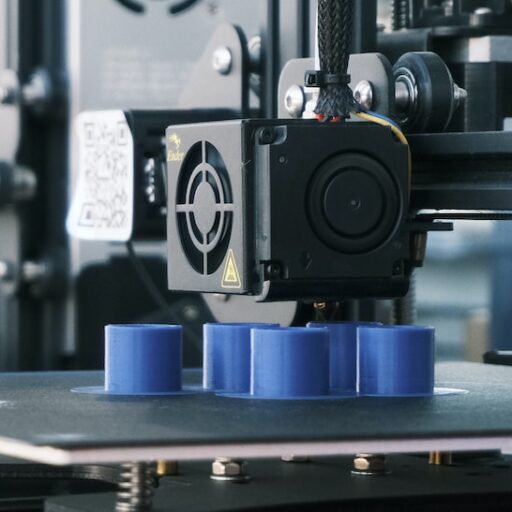Support our educational content for free when you purchase through links on our site. Learn more
Is It Illegal to 3D Print Copyrighted Material? 9 Things to Know (2025) ⚖️

Imagine scanning your favorite superhero figurine, hitting “print,” and suddenly having a mini army of collectibles at your fingertips. Sounds like a dream, right? But before you unleash your inner creator, here’s the kicker: Is it actually legal to 3D print copyrighted designs? Spoiler alert—this question is far trickier than it seems, tangled in a web of intellectual property laws, fan art controversies, and evolving tech safeguards.
At 3D Printed™, we’ve seen countless hobbyists and entrepreneurs stumble into legal gray zones without realizing it. From personal use to selling fan-made models, the rules aren’t always clear, and the consequences can be serious. In this comprehensive guide, we unpack 9 essential facts about the legality of 3D printing copyrighted material, share real-world case studies, and offer savvy tips to keep your prints both creative and compliant. Ready to decode the legal maze and print with confidence? Let’s dive in!
Key Takeaways
- Printing copyrighted 3D models without permission is generally illegal, especially for commercial use.
- Personal use printing is often tolerated but not guaranteed safe—laws vary by country.
- Fan art and derivative 3D prints sold without licenses carry high legal risks.
- Platforms like Thingiverse and MyMiniFactory actively remove infringing content under DMCA.
- Emerging tech like DRM and watermarking aim to curb unauthorized 3D printing.
- Hobbyists should use public domain or licensed models and create original designs.
- Stay informed and respect IP rights to avoid costly legal battles.
Looking to print legally? Check out trusted 3D printers and licensed model platforms:
- Prusa i3 MK3S+: Thingiverse | Amazon | Prusa Official Website
- MyMiniFactory (Licensed Models): MyMiniFactory
- Creality Ender 3 V2: Thingiverse | Amazon | Creality Official Website
Ready to print smart and safe? Keep reading!
Table of Contents
- Quick Tips and Facts ⚡️
- The Evolution of 3D Printing and Copyright Challenges 🕰️
- 3D Printing Explained: How It Works and Why It Matters 🖨️
- Why 3D Printing Copyrighted Material Raises Legal Eyebrows 👀
- 1. How Current Intellectual Property Laws Apply to 3D Printing ⚖️
- 2. The Fine Line: Personal Use vs. Commercial Exploitation 💼
- 3. Fan Art and 3D Printing: When Is It Legal to Sell? 🎨
- 4. The Role of DMCA and Anti-Circumvention Laws in 3D Printing 🔒
- 5. Gaps and Grey Areas: What the Law Doesn’t Cover Yet 🤔
- 6. How Hobbyists Can Safely Navigate Copyright Risks 🛠️
- 7. Measures and Technologies to Prevent Unauthorized 3D Printing 🚫
- 8. Case Studies: Famous Legal Battles Over 3D Printed Copyrighted Items ⚔️
- 9. The Future of 3D Printing and Intellectual Property Law 🔮
- Conclusion: What You Need to Know Before You Hit ‘Print’ 🏁
- Recommended Links for Further Reading 📚
- FAQ: Your Burning Questions Answered 🔥
- Reference Links and Legal Resources 📑
Ready to dive in? Let’s unravel the tangled web of 3D printing and copyright law together!
Quick Tips and Facts ⚡️
Welcome to the wild, wonderful world of 3D printing and copyright! Before we dive deep into the legal labyrinth, here are some quick nuggets to keep in mind:
- ✅ Printing for personal use is generally safer legally than selling copyrighted 3D prints.
- ❌ Selling fan art or copyrighted designs without permission can land you in hot water.
- ⚖️ Copyright protects the original creator’s rights to reproduce and distribute their work.
- 🕵️♂️ Fair use is limited and rarely covers commercial 3D printing.
- 🛠️ Hobbyists have some leeway, but it varies by country and context.
- 🔍 Technological measures and legal frameworks are evolving to address 3D printing challenges.
- 📚 For more on selling 3D printed items legally, check out our detailed guide: Can I Sell Things I Make with a 3D Printer? 2024.
Keep these in your back pocket as we unravel the complex dance between creativity, technology, and the law!
The Evolution of 3D Printing and Copyright Challenges 🕰️
3D printing, aka additive manufacturing, has exploded from a niche tech to a household hobby and industrial powerhouse. But with great power comes great legal questions.
From Prototypes to Personal Printers
- Early 1980s: 3D printing was mostly industrial, used for rapid prototyping.
- 2000s: Desktop 3D printers like MakerBot made printing accessible to hobbyists.
- Today: Millions of users print everything from toys to prosthetics — and yes, sometimes copyrighted stuff.
This rapid growth has outpaced intellectual property (IP) laws, which were designed for physical goods and traditional media, not digital files that can be copied infinitely.
Copyright Meets 3D Printing
- Copyright protects original works of authorship — including sculptures, designs, and digital files.
- A 3D model file is often considered a creative work and can be copyrighted itself.
- The question: Is printing a copyrighted object the same as copying a copyrighted work?
As Naima Alahyane Rogeon, a French IP lawyer, puts it: “The author of a 3D file must make a personalized intellectual effort so that the object conceived by the author of the original prototype can result in a printed object.” (WIPO Magazine)
3D Printing Explained: How It Works and Why It Matters 🖨️
Before we get tangled in legalese, let’s break down what 3D printing actually is — and why it’s so disruptive.
What Is 3D Printing?
- A process that builds objects layer by layer from a digital 3D model.
- Common materials: PLA, ABS plastics, resins, metals, ceramics.
- Popular printer brands: Prusa, Creality, Ultimaker, Formlabs.
Why It’s a Game-Changer
- Democratizes manufacturing — anyone with a printer can make complex objects.
- Enables rapid prototyping and customization.
- Opens doors for education, medicine, fashion, and art.
But here’s the kicker: the digital 3D model is the blueprint — and that’s where copyright law kicks in.
Why 3D Printing Copyrighted Material Raises Legal Eyebrows 👀
Imagine scanning your favorite action figure and printing a dozen copies. Sounds fun, right? But legally, it’s a minefield.
The Core Issue: Copying vs. Creating
- Copyright law protects the original design, not just the physical object.
- Printing a copyrighted design without permission is often seen as unauthorized reproduction.
- Even if you create the print yourself, the digital file may be protected as a creative work.
Fan Art & Derivative Works
- Fan art 3D models are derivative works based on copyrighted characters.
- Selling these models is usually illegal without a license.
- Some companies tolerate small-scale fan creations, but that’s not a legal shield.
1. How Current Intellectual Property Laws Apply to 3D Printing ⚖️
Let’s get our legal hats on and see how existing laws tackle this new tech.
Copyright Law
- Protects original works of authorship including sculptures and digital files.
- The Berne Convention (Article 6bis) protects moral rights — the author’s right to claim authorship.
- 3D files can be copyrighted as software or artistic works.
Patent Law
- Protects functional inventions.
- Printing patented objects without permission can be patent infringement.
- France’s Intellectual Property Code (Article L 613-4) prohibits supplying means to use an invention without authorization.
Trademark Law
- Protects brand identifiers.
- Using trademarks in printed objects can lead to trademark infringement if used commercially.
International Agreements
- TRIPS Agreement allows limited exceptions for private use.
- But commercial use is generally restricted.
2. The Fine Line: Personal Use vs. Commercial Exploitation 💼
Here’s where things get tricky — printing for yourself vs. printing to sell.
| Aspect | Personal Use | Commercial Use |
|---|---|---|
| Legal Risk | Low to moderate (varies) | High |
| Copyright Infringement | Often tolerated | Usually infringement |
| Enforcement Likelihood | Rare | Common |
| Examples | Printing a gift or replacement part | Selling fan art figurines |
Hobbyists printing for personal enjoyment are usually safer, but selling prints based on copyrighted designs without permission is a legal gamble.
3. Fan Art and 3D Printing: When Is It Legal to Sell? 🎨
Selling fan art 3D models? Hold your horses!
The Legal Reality
- Fan art is almost always copyright infringement if sold without a license.
- Changing the name or tweaking the design slightly doesn’t make it legal.
- Some fan art may qualify as transformative or parody, but this is a narrow exception and rarely applies to 3D prints.
Real Talk from the Trenches
On forums like Polycount, creators warn:
“It stops being fan-art when you try to sell it. At that point, it becomes a for-profit endeavor, which is much more complicated legally.” (Polycount Discussion)
4. The Role of DMCA and Anti-Circumvention Laws in 3D Printing 🔒
The Digital Millennium Copyright Act (DMCA) is a big player here.
What Does DMCA Do?
- Prohibits circumventing digital rights management (DRM).
- Makes it illegal to distribute tools or files that enable unauthorized copying.
- Applies to 3D printing files and platforms hosting them.
Impact on 3D Printing
- Sharing or downloading copyrighted 3D files can violate DMCA.
- Platforms like Thingiverse and MyMiniFactory have policies to remove infringing content.
- Some 3D printer manufacturers cooperate with rights holders to limit unauthorized use.
5. Gaps and Grey Areas: What the Law Doesn’t Cover Yet 🤔
The law is playing catch-up with this tech, leaving many questions unanswered.
Unclear Ownership
- Who owns a 3D print when design, modeling, and printing are done by different people?
- Are modelers co-authors or co-inventors?
Digitizing Existing Objects
- Is scanning a physical copyrighted object and sharing its 3D file legal?
- What about modifying existing designs?
Enforcement Challenges
- Policing private 3D printing is nearly impossible.
- Legal frameworks vary widely by country.
6. How Hobbyists Can Safely Navigate Copyright Risks 🛠️
Don’t let legal worries kill your creative buzz! Here’s how to stay on the right side of the law.
Tips for Hobbyists
- ✅ Print only for personal use — no selling or distribution.
- ✅ Use public domain or Creative Commons licensed models.
- ✅ Create original designs or heavily modify existing ones.
- ✅ Avoid scanning and sharing copyrighted objects.
- ✅ Stay informed about your country’s IP laws.
Resources for Safe Models
- Thingiverse — tons of free, legal models.
- MyMiniFactory — verified and licensed content.
- Pinshape — community with clear licensing.
7. Measures and Technologies to Prevent Unauthorized 3D Printing 🚫
Rights holders and platforms are fighting back with tech and policy.
Technological Protection Measures (TPMs)
- Embedding unique identifiers or watermarks in 3D files.
- Using encryption to restrict file access.
- Printer firmware that checks for authorized files.
Platform Policies
- Sites like Thingiverse have take-down procedures for infringing content.
- Collaboration between IP owners and 3D printer makers to limit unauthorized prints.
Emerging Solutions
- Subscription models for licensed 3D prints (similar to Spotify for music).
- Cloud-based printing services that control file distribution.
8. Case Studies: Famous Legal Battles Over 3D Printed Copyrighted Items ⚔️
Let’s peek behind the curtain at some headline-grabbing disputes.
Defense Distributed vs. U.S. Government
- The infamous 3D-printed gun files controversy.
- Legal battles over distribution of firearm blueprints online.
- Raised questions about free speech vs. public safety.
Hasbro vs. Shapeways
- Hasbro sent cease and desist letters to sellers of 3D printed Transformers fan art.
- Shapeways tightened policies to avoid hosting infringing models.
Turbosquid and Real-World Replicas
- Lawsuits over 3D models of cars and guns that infringe on trademarks and design patents.
- Highlights the risk of selling realistic replicas without licenses.
9. The Future of 3D Printing and Intellectual Property Law 🔮
What’s next in this evolving saga?
Legal Trends to Watch
- Potential new laws specifically addressing 3D printing.
- More clarity on private use exceptions.
- Increased cooperation between IP holders and 3D printing platforms.
Tech Innovations
- Advanced digital rights management for 3D files.
- AI-powered tools to detect infringing models online.
- Growth of licensed marketplaces for 3D prints.
What We at 3D Printed™ Predict
- The balance will shift towards protecting creators while encouraging innovation.
- Hobbyists will enjoy more freedom with clear guidelines and legal safe harbors.
- Commercial sellers must obtain licenses or create original content to thrive.
Conclusion: What You Need to Know Before You Hit ‘Print’ 🏁
Phew! We’ve navigated the fascinating yet complex intersection of 3D printing and copyright law together. Here’s the bottom line from your friends at 3D Printed™:
- 3D printing copyrighted material without permission is generally illegal, especially if you’re selling or distributing it. That includes fan art, replicas, and scanned objects.
- Personal use printing is usually tolerated but not a guaranteed legal shield—laws vary by country and context.
- The law is still catching up, with many grey areas and gaps, so staying informed and cautious is key.
- Platforms and rights holders are increasingly cracking down on unauthorized sharing and printing, so expect tighter controls.
- The best way to stay safe? Create original designs, use public domain or licensed models, and always respect IP rights.
- For hobbyists, 3D printing remains a thrilling creative outlet — just keep it legal and ethical to avoid headaches.
Remember, the digital file is the blueprint, and copying it without consent is usually the legal sticking point. So next time you’re tempted to print that cool copyrighted figurine, ask yourself: “Do I have the right to do this?” If not, get creative and design your own masterpiece instead!
Recommended Links for Further Reading 📚
Ready to explore or shop? Here are some top picks and resources to fuel your 3D printing journey — legally and creatively!
-
👉 Shop 3D Printers & Accessories:
- Prusa i3 MK3S+: Thingiverse | Amazon | Prusa Official Website
- Creality Ender 3 V2: Thingiverse | Amazon | Creality Official Website
- Formlabs Form 3 (Resin Printer): MyMiniFactory | Amazon | Formlabs Official Website
-
Explore Licensed & Public Domain 3D Models:
-
Books on 3D Printing and IP Law:
FAQ: Your Burning Questions Answered 🔥
What are the laws and regulations surrounding 3D printing copyrighted items?
3D printing copyrighted items falls under copyright, patent, and trademark laws. Copyright protects original creative works, including sculptures and digital 3D files. Patent law covers functional inventions, and trademark law protects brand identifiers. International agreements like the Berne Convention and TRIPS set minimum standards, but enforcement and specifics vary by country. Generally, unauthorized reproduction or distribution of copyrighted 3D models is illegal, especially for commercial purposes. However, some exceptions exist for private, non-commercial use, but these are limited and vary widely.
Can I 3D print a copyrighted design for personal use without getting in trouble?
Printing a copyrighted design for personal, non-commercial use is often tolerated and may fall under “private use” exceptions in some jurisdictions. However, this is not a blanket legal right everywhere. Some countries have explicit “private copying” exceptions, but others don’t. Also, sharing or distributing the files is usually illegal regardless of personal use. If you’re printing for yourself and not distributing or selling, the risk of legal action is low, but it’s not zero. Always check local laws and avoid sharing copyrighted files.
How do I know if a 3D printing design is copyrighted or public domain?
Most 3D models are copyrighted by their creators by default. To determine if a design is free to use:
- Look for explicit licensing information (Creative Commons, public domain, or commercial licenses).
- Use reputable platforms like Thingiverse, MyMiniFactory, or Pinshape that clearly label licensing.
- If the model is a replica of a trademarked or patented product, it’s likely protected.
- Public domain works are usually very old or explicitly released without restrictions.
- When in doubt, assume it’s copyrighted and seek permission or use original designs.
What are the consequences of 3D printing copyrighted material without permission from the copyright holder?
Consequences can range from:
- Cease and desist letters demanding you stop printing or selling.
- Removal of infringing content from online platforms.
- Monetary damages or fines if taken to court.
- Legal fees and potential injunctions against further infringement.
- In extreme cases, criminal charges may apply (rare but possible).
Companies like Hasbro and Disney actively protect their IP and have pursued legal action against unauthorized sellers. Even if enforcement seems rare for hobbyists, selling or distributing copyrighted prints is a serious legal risk.
How can I create 3D printed items inspired by copyrighted works without infringing?
- Focus on transformative works that add new expression or meaning (parody, commentary).
- Create original designs inspired by themes rather than direct copies.
- Obtain licenses or permissions from IP holders.
- Use public domain characters or designs.
- Consult legal advice if planning commercial use.
Reference Links and Legal Resources 📑
- WIPO Magazine: 3D Printing and IP Law
- Berne Convention for the Protection of Literary and Artistic Works
- TRIPS Agreement – WTO
- Polycount Forum Discussion: Is Selling Fanart 3D Models for 3D Printing Illegal?
- Thingiverse Copyright Policy
- MyMiniFactory Terms of Service
- Hasbro Legal Notices
Ready to print responsibly? Keep creating, stay curious, and respect the art and law behind every design! 🚀


